|
|
|
Sort Order |
|
|
|
Items / Page
|
|
|
|
|
|
|
| Srl | Item |
| 1 |
ID:
080875
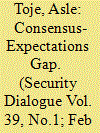

|
|
|
|
|
| Publication |
2008.
|
| Summary/Abstract |
By 2008, what is commonly known as the EU's `capability-expectations gap' has narrowed considerably. While the EU has made notable improvements in terms of its resource availability, as well as the instruments at its disposal, a gap between what the EU member-states are expected to do in the world and what they are actually able to agree upon persists. This article argues that the primary reason why the European Union is unable to deliver the foreign and security policies expected is a lack of decisionmaking procedures capable of overcoming dissent. Repeated attempts to surmount the drawbacks of consensus policymaking have only marginally improved the consistency and effectiveness of the Common Foreign and Security Policy (CFSP). These efforts are assessed by applying consensus as a `conceptual lens' through which to select and assess information. The real-world impact of the lack of cohesiveness, the capacity to make assertive collective decisions and stick to them, is illustrated by Europe's handling of the crisis in the Sudanese province of Darfur in the period 2003-08. The main finding of the article is that as long as the consensus-expectations gap exists, the EU is likely to remain a partial and inconsistent foreign policy actor.
|
|
|
|
|
|
|
|
|
|
|
|
|
|
|
|
| 2 |
ID:
108582
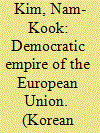

|
|
|
|
|
| Publication |
2011.
|
| Summary/Abstract |
This paper examines the EU's conflicting roles as a global actor between a normative
leader and a realistic compromiser. Since the Kosovo and Iraq wars, the EU has
experienced rapid progress in two policy areas: asylum and refugees; security and
defense. Although the two policy areas belong to different pillars, they were both
accelerated through the wars where Europe painfully recognized its incompetence.
This paper argues that increasing prioritization of security issues eventually
undermines the foundations of the EU's established commitment as a normative
leader in the area of human rights policies. Fortress Europe with strong military
power and clear borders would build the wall between Europe and non-Europe
higher and reinforce the characteristics of the EU as a realistic compromiser that
regenerates the exclusive nature of nation states, only different in its gigantic size.
It would then be difficult to distinguish the EU's identity as a new experiment of
peace projects from a neo-imperial hegemon of the world.
|
|
|
|
|
|
|
|
|
|
|
|
|
|
|
|
| 3 |
ID:
130942
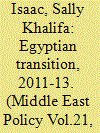

|
|
|
|
|
| Publication |
2014.
|
| Summary/Abstract |
This paper tackles the political and security complications of the Egyptian transition from its inception in January 2011 until the fall of the Muslim Brotherhood president, Mohamed Morsi, in July 2013, with a primary focus on how these complications are of strategic importance to Europe. It starts with inferring Egypt's role in European Union (EU) approaches to security in the Mediterranean, which were acknowledged in the 2003 European Security Strategy and then largely interpreted in the 2004 European Neighborhood Policy. It argues that the old EU democracy-stability dilemma persisted in Europe's approach to the Egyptian transition, especially during Morsi's one-year presidency. In discussing the current political and security complications of the Egyptian transition and how they constitute strategic concerns to Europe, the analysis tackles undermined social cohesion in Egypt due to processes of repolarization in Egyptian society after July 2013; the question of Egypt's porous borders with the Hamas-controlled Gaza Strip; the emergence of the Sinai Peninsula as a jihadist center; and the rising importance of economics in the EU-Egyptian relationship
|
|
|
|
|
|
|
|
|
|
|
|
|
|
|
|
| 4 |
ID:
108776
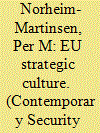

|
|
|
|
|
| Publication |
2011.
|
| Summary/Abstract |
After being debated in academic circles for years, the idea of a common European Union strategic culture was elevated to a policy objective in the 2003 European Security Strategy. However, whether the European Union has a strategic culture or not is still up for debate. By drawing on developments in strategic culture theory, this article demonstrates that the idea of strategic culture is not only compatible with the European Union, but may be a particularly useful conceptual tool for studying actors for which cultural factors can make up for the lack of more material ones, such as borders, language, political structure, national history, and so on. Offering a fresh perspective on the European Security Strategy, it shows that a specific strategic culture has evolved in the EU, in which consensus on a comprehensive approach to security as a unique European asset has become a focal point for the fledgling European Security and Defense Policy (ESDP). However, the article concludes that this does not provide for a robust strategic culture. The repeated emphasis on the EU's unique potentials as a comprehensive security actor will also invite criticism if the EU fails to mount operations that reflect its own success formula.
|
|
|
|
|
|
|
|
|
|
|
|
|
|
|
|
| 5 |
ID:
123885
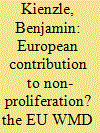

|
|
|
|
|
| Publication |
2013.
|
| Summary/Abstract |
In the aftermath of the ruptures caused by the Iraq crisis, European states agreed in December 2003 on both a European Security Strategy and an EU Strategy against the Proliferation of Weapons of Mass Destruction (WMD).
Ten years have passed since this attempt to kick-start common European policies on WMD proliferation. How well have EU policies performed in this area? Has a specifically European way of dealing with proliferation challenges emerged?
This article traces the development of EU policies on WMD proliferation since 2003 by examining, in particular, European reactions to the nuclear crisis in Iran, as well as European interactions with the international non-proliferation regime and the cooperation with partner countries. The article concludes that the EU has performed much better than might have been expected in an area that has traditionally been one of the fiercely guarded prerogatives of national security policies.
The EU's good performance is very much related to institutional flexibility, as exemplified by the EU/E3 approach to Iran, and to a high degree of political pragmatism. However, important shortcomings remain, most notably the lack of coordination between national and European non-proliferation efforts. In other words, the EU has not in the last 10 years turned into a fully fledged non-proliferation actor that can deliver tangible results in any area of proliferation concern.
|
|
|
|
|
|
|
|
|
|
|
|
|
|
|
|
| 6 |
ID:
108774
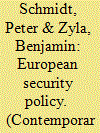

|
|
|
|
|
| Publication |
2011.
|
| Summary/Abstract |
With the Lisbon Treaty in place and the European Union increasingly involved in crisis management and stabilization in places near and far, this Special Issue examines whether European security behaviour is evidence of an actual strategic culture. Contrary to prevailing scholarship on the subject, this volume demonstrates that strategic culture, as an analytical tool and force on European strategic goals and conduct, is far from conclusive. Ostensibly, the development of a security culture was a major lever by which the European Union's principal planning document, the European Security Strategy of 2003, tried to guide the European Union's role in international security. This volume revisits the trajectory of the concept of strategic culture and examines its application in a variety of circumstances, especially operations in Africa and the Balkans, including joint operations with NATO and the United Nations. The contributors to this Special Issue find that strategic culture is a useful tool to understand EU's operations, not in the sense of a 'cause', but as a uniquely European normative framework of preferences and constraints. Classical notions of strategic culture must be adapted to highlight the specific evolution of Europe's strategic culture. Though at variance over the extent to which security and defense missions have promoted a shared strategic culture in Europe, the authors in this Special Issue reveal a growing sense that a strategic culture is critical for European ambition as a global actor. Should Europe fail to nurture a shared strategic culture, its ambitions and the normative framework that underpins it will unravel.
|
|
|
|
|
|
|
|
|
|
|
|
|
|
|
|
| 7 |
ID:
154840
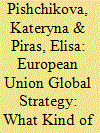

|
|
|
|
|
| Summary/Abstract |
Some dismiss the recent EU Global Strategy as a “triumph of hope over experience”, an impracticable and therefore ultimately irrelevant statement; others are enthusiastic about what they see as perseverance and renewed ambition in the face of the present crisis. Although the 2016 Strategy appears more modest than its 2003 predecessor in operational terms, the range of deliberations that fed into it and the quality of the document itself demonstrate a greater maturity of reflection on foreign policy. A critical reading of the document shows that concepts such as normative power and differentiated inclusion of neighbours in the EU’s system of governance have all but disappeared. The emerging EU identity appears to be debilitated by the centrifugal processes of internal contestation and a drastically downsized claim for external power projection. An alternative plan for action will have to deal with the Union’s vulnerabilities and carve out a role that is distinct, yet in line with this new self-understanding.
|
|
|
|
|
|
|
|
|
|
|
|
|
|
|
|
| 8 |
ID:
108778
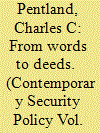

|
|
|
|
|
| Publication |
2011.
|
| Summary/Abstract |
Evidence that the European Union has acquired a distinctive strategic culture must be sought in the realms both of ideas and of action. Elements of a declaratory European Union strategic culture are to be found in the 2003 European Security Strategy and the subsequent reflections of officials and academics. A supplementary but perhaps more reliable guide to its central features may lie in how the European Union has conducted itself in the 24 European Security and Defence Policy missions, both military and civilian, that it has created since 2003. Overviews of these missions reveal some consistent themes and patterns of behaviour roughly congruent with the discourse of EU strategic culture. A closer analysis of the two Balkan military operations - Concordia in the Former Yugoslav Republic of Macedonia and Althea in Bosnia-Herzegovina - gives a richer and more nuanced picture of the relationship between words and deeds. The aim in studying strategic culture should be not to reveal causality as much as to explore consistency between ideas and action.
|
|
|
|
|
|
|
|
|
|
|
|
|
|
|
|
| 9 |
ID:
113262
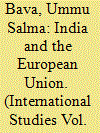

|
|
|
|
|
| Publication |
2010.
|
| Summary/Abstract |
Relations between India and the European Union (EU) have evolved over a long period. Beginning in the early 1960s, with diplomatic relations being established between India and the European Economic Community (EEC), it has expanded and subsequently been transformed because both India and the EU (since 1992) have assumed a growing significance in post-Cold War international politics. However, this partnership has not been able to achieve its potential partly because of the low political visibility of the EU and strong bilateral relations between India and major European powers. The India-EU relationship in the context of the strategic partnership launched in 2004 has witnessed a dramatic expansion of engagement from the economic to the political and security realms, although the strategic partnership does not mean absence of differences and difficulties. There is, however, a perception that India's closeness to the US has impacted the development of partnerships with both the EU and major individual countries.
|
|
|
|
|
|
|
|
|
|
|
|
|
|
|
|
| 10 |
ID:
123569
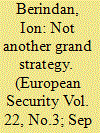

|
|
|
|
|
| Publication |
2013.
|
| Summary/Abstract |
The article advocates that the current proposals for a new European security strategy aim to a similar or even more ambitious strategy than the original 2003 one, calling in effect for a European 'grand strategy' in world affairs. Taking into account the original aims and consequent results of the initial European security strategy and related documents, it argues that the European Union (EU) was not and is still not prepared to undertake a security project of such scope due to severe limitations in terms of structure, capabilities and learning curve, now and in the near future. Rather than insisting with an approach that produced very little, the EU should abandon the traits of a grand strategy in favour of a more realistic and restrained project that could focus on security matters in its neighbourhood including the problematic Russian and Turkish issues while relying on better transatlantic relations and true multilateralism.
|
|
|
|
|
|
|
|
|
|
|
|
|
|
|
|
| 11 |
ID:
123883
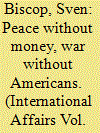

|
|
|
|
|
| Publication |
2013.
|
| Summary/Abstract |
Just as the shift of the American strategic focus to Asia and the Pacific forces strategic autonomy upon Europeans, the financial crisis limits their means. In the age of austerity, dispersed efforts and spending on secondary issues have become unaffordable. Prioritizing and making strategic choices have become more important than ever.
As no single European state can face all these challenges alone, a joint European strategy must assess where collective foreign and security policies can bring the most added value to the national effort. Through the European Union, Europeans have attempted as much in the 2003 European Security Strategy, but for lack of prioritization, the EU has so far underperformed. Yet the EU does have access to substantial means and possesses all the necessary instruments to pursue a comprehensive strategy.
The key to their effective use is a collective European strategic review, starting from the vital interests that all European states have in common. Two priorities stand out: making a new start in Europe's relations with its southern neighbours after the Arab Awakening, and deciding which responsibilities Europeans will assume as security providers outside their borders after the American 'pivot' to Asia.
|
|
|
|
|
|
|
|
|
|
|
|
|
|
|
|
| 12 |
ID:
076802


|
|
|
|
|
| Publication |
2007.
|
| Summary/Abstract |
Several new ways of security-speak are about to enter the European scene. The article seeks to identity these by investigating the use and unfolding of the security argument in the context of the European Union's (EU) new security doctrine and the devising of an explicit neighbourhood policy. In addition to tracing the way the plot structure underpinning the EU is changing, alternative options are sought by tapping into the potential offered by the way security works in the case of the Nordic constellation. Juxtaposing of the EU and the Nordic entity is also there in order to challenge the increasingly closed and non-negotiable European configuration and to open it up for critical scrutiny.
|
|
|
|
|
|
|
|
|
|
|
|
|
|
|
|
|
|
|
|
|